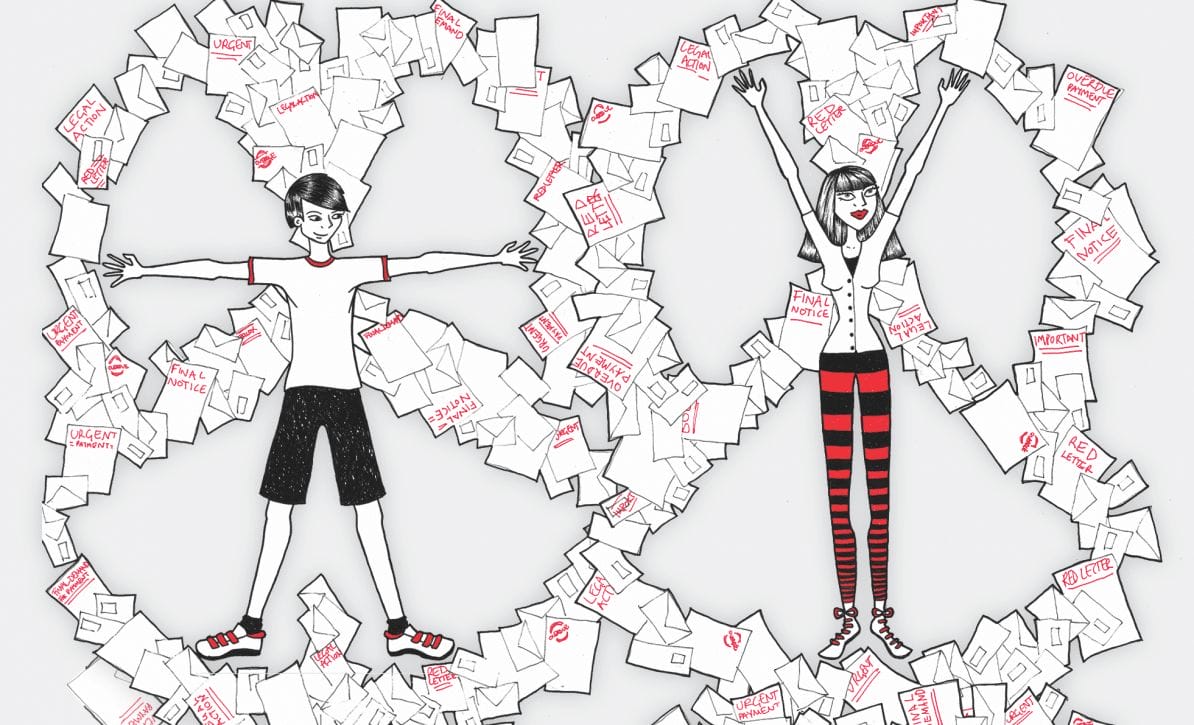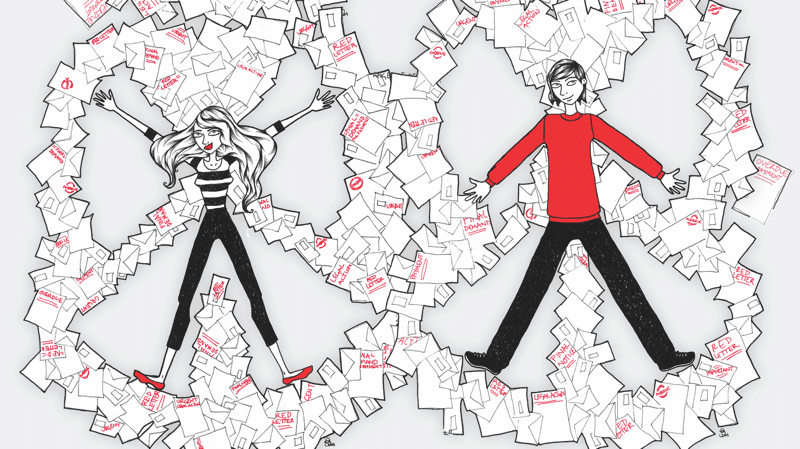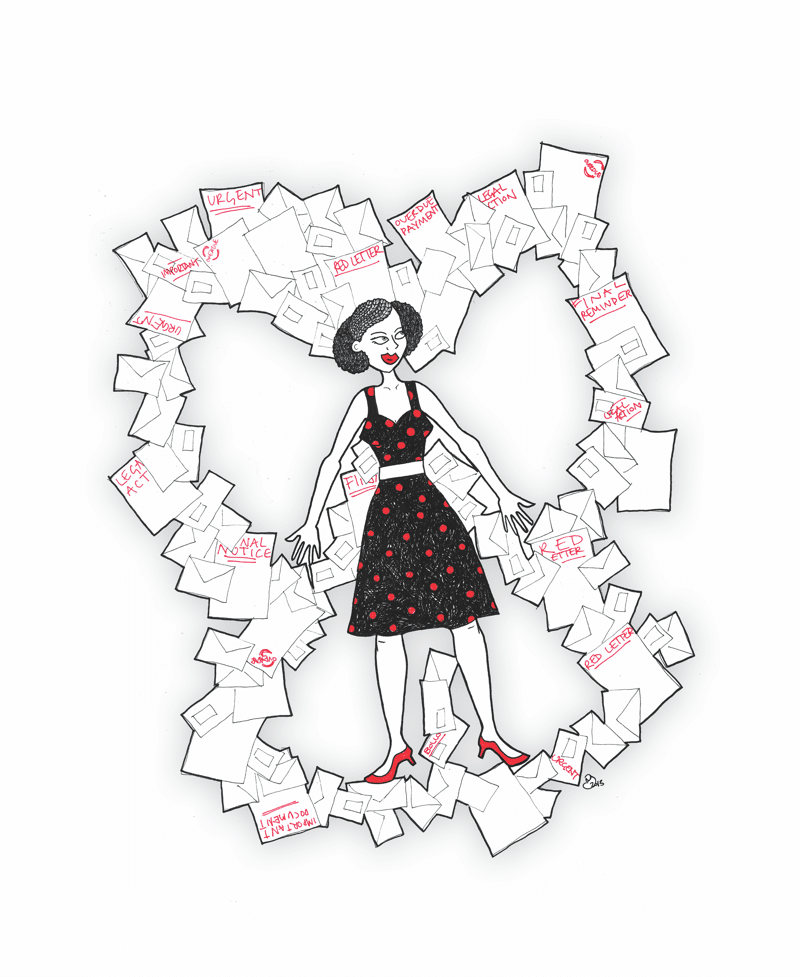Strike Debt: the activists on a mission to write off America’s personal finance crisis
In February 2013, just as Barack Obama was signing into law the ‘No Budget, No Pay Act’, allowing the US treasury to accumulate more debt, a small group of guerrilla philanthropists were making plans to abolish more than a million dollars of unpaid medical bills – and make a big statement about America’s life in the red. Matthew Lee tells the story of the people’s bailout

Illustrations: Anne Gerrish
4th February 2013 (Taken from: #10)
The 44 little red boxes landed in mailboxes just in time for Christmas 2012. Each had been carefully hand-wrapped and adorned with a white ribbon. Each was opened by a person in upstate New York who had significant medical debt. The first line of the letter contained within read as follows:
“Season’s Greetings from Strike Debt! We have good news: the referenced account has been purchased by the Rolling Jubilee Fund, a nonprofit organisation. The Rolling Jubilee Fund is a project of Strike Debt. The mission of the project is to buy and abolish personal debt. We believe that no one should have to go into debt for the basic things in our lives, like healthcare, housing and education.”
And then, just in case the purpose of the package was unclear, it was written in bold:
“You no longer owe the balance of this debt. It is gone, a gift with no strings attached. You are no longer under any obligation to settle this account with the original creditor, the bill collector, or anybody else.”
The secret Santa was Strike Debt, a coalition of groups that formed during the Occupy protests on Wall Street in 2011. Although Strike Debt is a secular group, the name Rolling Jubilee was inspired by a story from the Bible – every 50 or so years, it is written in the Old Testament, all slaves and prisoners were freed, and all debts were forgiven in a ‘Jubilee’.

Occupy Wall Street (OWS) – and indeed the Occupy movement in general – has often been criticised for its ambiguous goals and lack of a central message. It established a compelling pitch of the 99 percent versus the privileged one percent, but has struggled to offer solutions. It’s known as a leaderless mass movement whose affiliate groups lobby for disparate goals. Strike Debt may be the one Occupy offshoot to supply a unifying agenda and could be the first to demonstrate concrete success.
Strike Debt formed following a series of assemblies in New York’s Washington Square Park at which speakers were encouraged to open up about what it’s like being a debtor. Those with tales of financial gloom weren’t alone; approximately three-quarters of Americans are in debt, in most cases due to the high cost of healthcare and education. Nearly two-thirds of bankruptcies in the US are caused by a medical illness.
Such startling figures, Strike Debt argues, prove that debt in the US won’t simply disappear if people adopt a more prudent approach to personal finance: this, they say, is a systemic problem. If you don’t have a wealthy family and you want to get yourself educated, you’re going to be in a huge amount of debt at the start of your career. And even if you’re lucky enough to be in the black, your city is most likely in debt, which will affect your quality of life. Towns across America, according to Strike Debt, are being “held hostage by the same banks that have been bailed out by our government in recent years”.
The Strike Debt collective published a book that’s freely downloadable, ‘The Debt Resistor’s Operational Manual’, a 132-page guide to how debt works. The work guides readers through their options as a debtor. These include refusing to repay student loans, defaulting on credit card debts and declaring bankruptcy. Business Insider lambasted the book for giving readers “some of the dodgiest financial advice we’ve ever seen”, but others praised it for its clearheadedness in explaining a dauntingly convoluted system.
This fire-sale system allows Rolling Jubilee to abolish $1,000 of debt for every $50 raised”
Aleks Perisic, a member of Strike Debt who works on the Rolling Jubilee project, says that they “aim to change the way the public perceives debt so it’s not so much about personal failure and shame but a consequence of a structural problem”. They also hope to draw wider attention to what their website describes as a “shadowy, speculative market of debt buyers”; it’s a murky world in which debt is bought in bundles at a fraction of its potential value. These debt buyers then make huge profits by hounding debtors into repaying the full amount. Strike Debt aim to disrupt the process by buying bundles of debt at the stage where it’s being sold on the cheap. They keep it away from the debt collectors, and they abolish it.
This fire-sale system in which debt is offloaded to anyone who sets themselves up as a debt collector (a simple process in the US) allows Rolling Jubilee to abolish approximately $1,000 of debt for every $50 raised. With a bit of help from indie-rock royalty including members of Sonic Youth, TV on the Radio and Neutral Milk Hotel, the group staged a telethon in November 2012 and raised $270,000, enough to buy $5m of debt.
“The response to the telethon was incredible,” says Perisic. “We got hundreds of emails and although we had a team working full-time, we couldn’t clear our inbox. People from all over the country were getting in touch and it was interesting how many donors were in debt themselves. We call our project ‘a bailout by the people for the people’ and we hope to raise consciousness around the issue while offering mutual aid.”
On 17th March 2013, Rolling Jubilee announced its second big buy, which resulted in the abolition of more than a thousand unpaid medical debts totalling more than a million dollars, mostly in the Midwest. But the project has not been universally applauded. Some have voiced concerns over a possible tax risk – in that the forgiven debt may be viewed as a form of taxable income by the IRS (the organisers argue that gifts aren’t subject to the same taxation laws). And then there’s the reality that the abolition of a million dollars of debt every few months is barely a drop in the ocean – student debt alone totals more than a trillion dollars in the US. Strike Debt’s work in clearing unpaid healthcare bills still leaves around 50 million Americans currently paying off medical debt – up from 37 million in 2005.
Why is debt being sold at a fraction of its value? Why do banks get bailed out but not people?”
The organisers say they’re not trying to offer a solution, they’re trying to draw attention to a problem. They are raising some important questions: why is debt being sold at a fraction of its value? Why do banks get bailed out but not people? Why do Americans pay some of the highest costs for healthcare and education in the world?
In his 2011 book ‘Debt: The First 5,000 Years’, anthropologist David Graeber analyses the role the concept of debt has played in human history before concluding with a bold proposal.
“It seems to me that we are long overdue for some kind of Biblical-style Jubilee: one that would affect both international debt and consumer debt. It would be salutary not just because it would relieve so much genuine human suffering, but also because it would be our way of reminding ourselves that money is not ineffable, that paying one’s debts is not the essence of morality, that all these things are human arrangements and that if democracy is to mean anything, it is the ability to all agree to arrange things in a different way.”
A Biblical-style Jubilee may be an impossible dream. But for the tiny percentage of debtors randomly selected by Rolling Jubilee, life without debt is now a possibility.

Slow Journalism in your inbox, plus infographics, offers and more: sign up for the free DG newsletter. Sign me up
Thanks for signing up.








